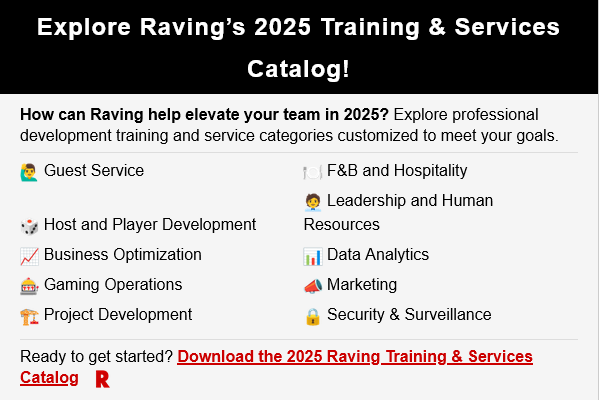By Jeff Gray, Raving Partner, Business Optimization and CEO, Lean Revisions
In today’s rapidly changing business environment, organizations must continuously adapt to remain competitive. Toyota, a global leader in operational efficiency, has perfected lean management principles, focusing on leadership vision, workforce empowerment, and shared values. These principles, when applied effectively, can drive operational excellence and improve engagement across various sectors.
This topic was presented to attendees at Raving NEXT 2025 with the goal to explore Toyota’s lean management system and how tribal organizations can leverage these practices to optimize operations and enhance workforce engagement.
This article summarizes the key insights provides actionable steps for tribal organizations to implement lean management strategies.
Understanding Toyota’s Lean Management System
Toyota’s management system is built on a culture of continuous improvement, efficiency, and collaboration. The key elements of this approach include:
1. Leadership Vision and Workforce Empowerment
Toyota’s success is largely driven by strong leadership and an empowered workforce. The company operates on a system where leaders actively engage with employees to foster innovation and efficiency. By adopting a similar approach, tribal organizations can:
- Align leadership goals with operational strategies.
- Encourage employees to take ownership of their roles.
- Develop a culture of problem-solving and innovation.
2. The Toyota Production System (TPS)
TPS is a structured approach that eliminates waste and improves efficiency. This system, widely known as Lean Manufacturing, focuses on:
- Just-in-Time (JIT) Production: Ensuring that materials and products are available only as needed, reducing excess inventory and waste.
- Standardized Workflows: Creating consistent and repeatable processes that enhance efficiency.
- Continuous Improvement (Kaizen): Encouraging employees at all levels to identify and implement improvements.
3. Breaking Down Silos and Improving Communication
One of Toyota’s strengths is its ability to integrate various departments and ensure seamless collaboration. Within tribal organizations, breaking down silos can improve:
- Casino and Hotel Operations: Synchronizing processes between gaming, hospitality, and other business functions.
- Supply Chain Efficiency: Managing inventory and procurement to minimize waste.
- Guest Experience: Ensuring a smooth and enjoyable experience for visitors through coordinated efforts.
Applying Lean Management to Tribal Organizations
Tribal gaming, hospitality, and commercial enterprises can benefit from Toyota’s principles by implementing lean management strategies in the following ways:
1. Identifying and Eliminating Waste
Toyota focuses on reducing Muda (waste) in every process. For tribal businesses, waste can occur in various forms, including:
- Excess Inventory: Overordering supplies for food and beverage operations.
- Inefficient Processes: Slow customer service, lengthy check-in times, or outdated procedures.
- Employee Turnover: High turnover rates leading to increased hiring and training costs.
2. Enhancing Customer Experience
A key goal of lean management is to optimize the customer journey. This can be achieved by:
- Reducing wait times at casinos and hotels.
- Improving food and beverage service through better inventory management.
- Enhancing security measures while maintaining a welcoming environment.
3. Standardization and Visual Management
Toyota uses visual management tools to track performance and identify inefficiencies. Tribal organizations can apply similar techniques by:
- Implementing real-time dashboards to monitor operations.
- Creating standard operating procedures (SOPs) to ensure consistency.
- Using visual cues (e.g., color-coded systems) to improve workflow efficiency.
4. Leadership Engagement and Training
Toyota leaders actively participate in daily operations, a practice known as “Gemba” (go to the source). Tribal leaders can adopt this approach by:
- Spending time in different departments to understand operational challenges.
- Encouraging frontline employees to provide feedback and suggest improvements.
- Conducting leadership training on lean principles.
Case Study: Toyota’s Success in Lean Operations
This is information was garnered from a vist to Toyota Material Handling Plant in Indianapolis. Toyota’s ability to produce 85 forklifts per day using a flexible and highly efficient system demonstrates the power of lean operations.
Key takeaways from Toyota’s success:
- End-to-End Integration: Every department works cohesively to meet production goals.
- Engagement from All Levels: Employees at every level participate in continuous improvement initiatives.
- Data-Driven Decision-Making: Toyota relies on real-time data to optimize performance.
Overcoming Challenges in Lean Implementation
While lean management offers significant benefits, organizations must be prepared to navigate challenges such as:
- Resistance to Change: Employees may be hesitant to adopt new workflows.
- Lack of Training: Proper training is essential to ensure successful implementation.
- Short-Term Focus: Lean management requires a long-term commitment to continuous improvement.
To address these challenges, tribal organizations should:
- Start Small: Implement lean practices in one department before scaling across the enterprise.
- Engage Employees: Involve staff in decision-making and improvement initiatives.
- Measure Success: Use key performance indicators (KPIs) to track progress.
Conclusion: The Path Forward
Toyota’s lean management principles have transformed industries worldwide, and tribal organizations can benefit greatly by adopting these practices. By focusing on efficiency, leadership engagement, workforce empowerment, and continuous improvement, tribal businesses can optimize their operations and enhance customer experiences.
Remember, lean management is not just a methodology—it’s a mindset. Organizations that embrace these principles will be better equipped to navigate challenges, reduce costs, and create a culture of excellence.
Are you ready to implement lean management in your organization? Start today by identifying areas for improvement and engaging your team in the process! Contact Liz Palar (liz@betravingknows.com) or visit Raving’s Business Optimization page here.

